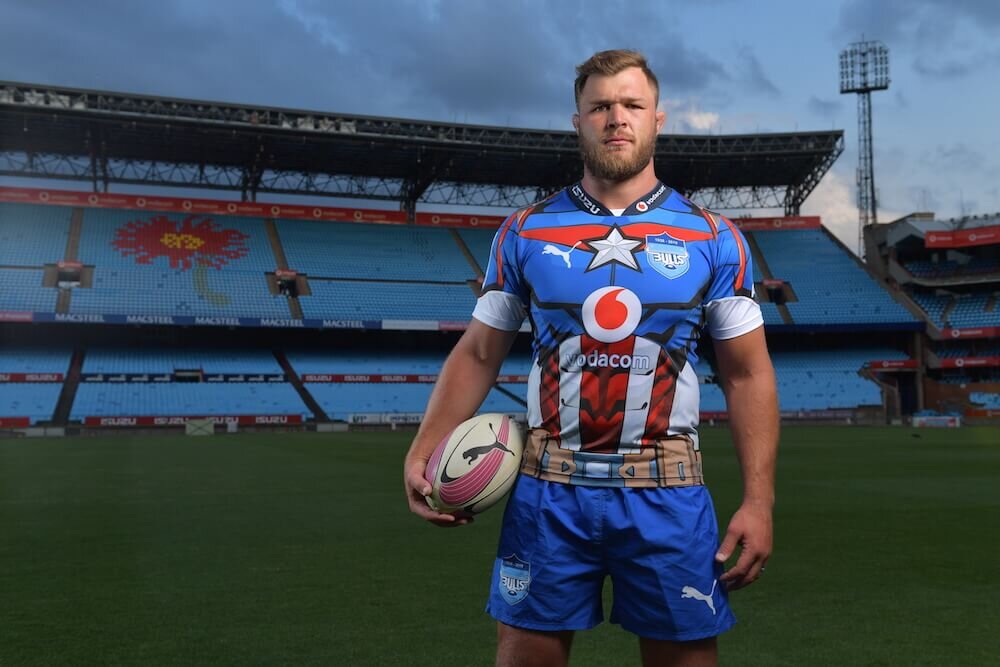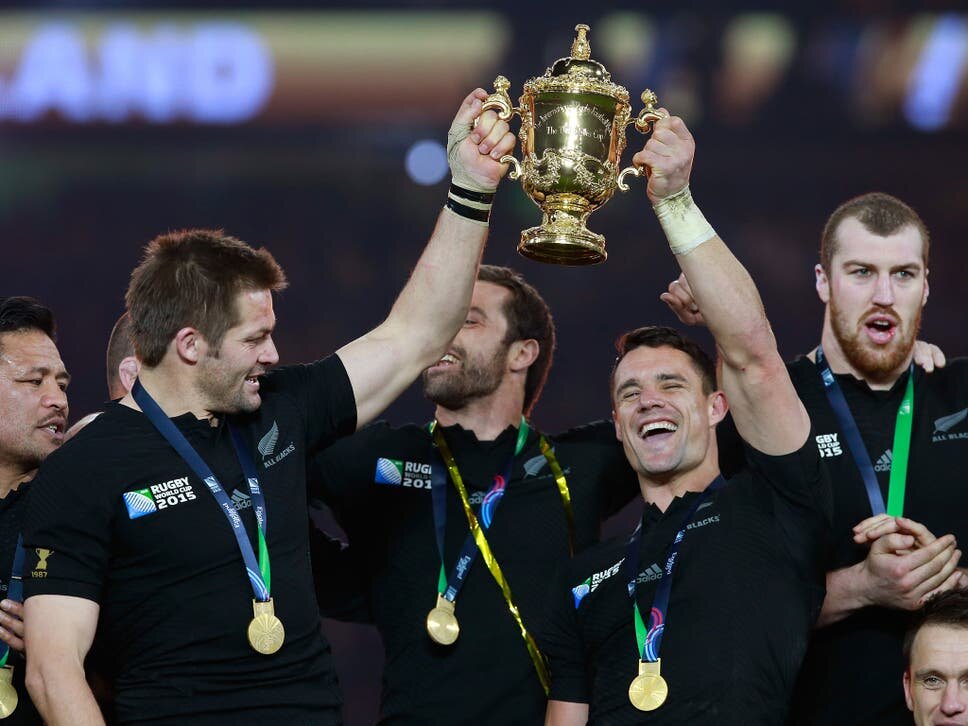The 2015 All Blacks - rugby’s The Last Dance?
Dan Carter and Richie McCaw lift the Rugby World Cup in 2015 - the last time either would play for the All Blacks
Credit: Getty Images
In a time when offerings from the sporting world have been few and far between, the collective attention of its usually captive audience has been drawn backwards.
With famous football matches and tournaments being replayed on TV or rugby clubs choosing weekly classic matches to stream online to their fans, the nostalgic force within sport has rarely been as heightened as it currently is.
With that in mind, this retrospective has been largely dominated by one shining example of the value of our global sporting past, in the form of Michael Jordan and Netflix’s game-changing documentary series, The Last Dance.
Following the story of the 1997-98 Chicago Bulls while interweaving the story with that of the near-decade of continuous success that preceded it, The Last Dance ticked all the boxes that sport fans look for week in and week out.
The development of a collective; the ups and downs of a team and its players; the emergence and recognition of a once-in-a-generation talent in Michael Jordan; the able support of his supporting cast and their own various moments in the sun; The Last Dance truly had it all.
It is a story that sees parallels in numerous sports, given its core thesis is the finale of a dynasty. However, there is one story in rugby that stands out as the equivalent more than any other - the story of the All Blacks and their journey to the 2015 World Cup, their second straight win.
But the real question is - was their story truly The Last Dance? Let’s examine the key facets of the Chicago Bulls story and see how the double World Cup-winning All Blacks stack up.
The team journey
With all success stories in team sports, it is just that which ultimately must be considered first - the team.
After all, if the Chicago Bulls had not won six NBA Championships in eight years, the franchise’s dynasty would not be so fondly remembered and the Michael Jordan legend would have become a footnote in history.
With that in mind, it is hard to imagine any sporting team that contains such consistent success as the All Blacks.
When you exclude the 2007 World Cup, that is. Eight years before New Zealand lifted its second straight World Cup, the team was in ruins.
In it’s own way, New Zealand’s 20-18 defeat against tournament hosts France was the spark that lit the new Kiwi revolution. Like the drafting of Michael Jordan in 1984, this was arguably the moment the national team’s fortunes changed.
Richie McCaw and then-All Blacks coach Graham Henry front the media after New Zealand’s 20-18 loss to France in the 2007 World Cup quarter-finals.
Credit: Stu Forster/Getty Images
At that point, much like Chicago still chasing its first ever title, New Zealand had failed to win a World Cup since the inaugural tournament in 1987. This had caused a severe ripple among the watching public, with the team being labelled as chokers.
Former captain Anton Oliver told The Guardian in 2011: “We had to re-interrogate the question of legacy and make it work for us, so we weren't weighed down with the burden of all those that had gone before us.”
And that was where the road started, because many in New Zealand had had enough.
The crucial thing, as New Zealand writer and broadcaster Phil Gifford vocalised in 2015, was the team shedding its arrogance and no longer “expecting to win”. The All Blacks put its ingrained arrogance to one side and embraced a genuinely professional attitude to its rugby.
The team learnt and understood that no matter what talent you had, there was no substitute for hard work. Michael Jordan understood that, and he taught his fellow Bulls that.
Four years later, when New Zealand met France again in the 2011 final, they did not choke. Arguably they should have lost, but they brought it home. After that however, the crucial difference was that they did not sit on their laurels.
Standards were driven higher and higher to the extent that a draw in the series against the British and Irish Lions in 2017 was met, as Amazon’s ‘All or Nothing’ series on the All Blacks notes through the words of Israel Dagg, with scenes “like someone had passed away”.
The leading light(s)
In a key divergence from the primarily Jordan-led Bulls, the All Blacks had two leading men. Two of the biggest names rugby has ever known.
In captaining his country to two World Cups, Richie McCaw has cemented his place as his country’s greatest captain. Playing alongside him, a decade of nothing short of pure excellence had seen Dan Carter billed as the game’s greatest ever player.
If you need any proof, here’s his performance against the Lions in 2005, commonly considered the greatest individual performance from a fly-half in history.
It was pretty clear to all concerned that, for these two cornerstones of the modern All Blacks, this would be their last dance. They had been part of the New Zealand setup for more than 12 years and both were not as young as they once were.
As Jordan led the charge for Chicago’s final three-peat , so did McCaw and Carter lead the march to a second straight World Cup.
Carter in particular, having been an early injury casualty in the 2011 tournament, managed the New Zealanders through a tough tournament path, including an absolute demolition of France in the quarter finals and steering them past a resurgent South Africa in the semis.
What is more, he stood up at the crucial moments to push the team past Australia in the final, including a vital late drop-goal to stem Aussie momentum.
And McCaw? He just did Richie McCaw. A pest at the breakdown, one of the biggest work-rates you’re likely to see and a cunningly calm manner with officials, McCaw was the heart and soul of his team in the way every captain should aspire to be.
When he lifted the cup in 2015, there was a real sensation that there was no-one else who could have done so that day. It was intended.
The coach
Here we have a pretty major diversion from the Bulls in the All Blacks story, for 2015 was far from the edge of the road for Steve Hansen.
Legendary Bulls coach Phil Jackson had built the success from the ground up. Hansen took a different path to the top, serving under head coach Graham Henry from 2004 until 2011, when he took over in the top job.
All Blacks coach Steve Hansen and captain Richie McCaw with the World Cup after the 2015 final
Credit: Phil Walter/Getty Images
However, just because he was not top dog for the first World Cup victory in 2011, does not mean Hansen did not have his fingerprints all over the team’s cultural shift.
As Jackson did in the 1990s, Hansen recognised winning started with demanding more and more and more from his players. Even after 2015, when the Kiwis seemed as though they might never lose a World Cup game again, Hansen saw that if he let standards drop an inch, they would fall a mile.
However, as the end of the era came in Chicago, Phil Jackson walked away, with it already well-known the 1997-98 season would be his last.
Hansen had no such pressures - he knew he was going nowhere, only that key members of his squad would be moving on.
However, there is no denying the parallels between the two - they took their teams from down and outers to a legacy that is yet to be topped in their respective sports.
The supporting cast
There are many who will tell you, and maybe rightly, that without Scottie Pippen or Dennis Rodman, there is no way the ‘98 Bulls go all the way.
The same is unequivocally true of the 2015 All Blacks.
McCaw and Carter were the big names that led the way, but the wider squad all had their fingerprints on this historic victory.
Julian Savea top-scored in the tournament with eight tries, including three in the crushing of France. Brodie Retallick put in a monumental performance to get them past Argentina when the Pumas were threatening an ambush in the opening game.
Sonny Bill Williams and Ma’a Nonu combined brilliantly in the centres for a crucial try in the final. Beauden Barrett raced away in the last minute to secure the win after also notching a crucial score off the bench in the semi-final against South Africa.
Beauden Barrett scores the clinching try in the final minute of the 2015 Rugby World Cup final
Credit: Paul Gilham/Getty Images
As the Bulls were in reality far more than a one-man show, the All Blacks were far more than a two-man outfit in 2015.
The victory at the end of it
This is what brings it all together. As the Bulls secured their second three-peat in 1998, so did the All Blacks become the first team to win back-to-back World Cups, and became the first side to win three at all.
As Jordan and Jackson ultimately went gentle into that good night did Carter and McCaw, arm in arm, head off into the rugby sunset.
The fitting ending to a dynasty is only complete when there is a success at its climax that cannot be tarnished, and no-one will be able to tarnish the memory of the great New Zealand sides of 2011 and 2015.
The sight of Carter and McCaw holding aloft the Webb Ellis Cup that had truly become their rightful property should cement in anyone’s mind that rugby truly did have an answer to The Last Dance.










